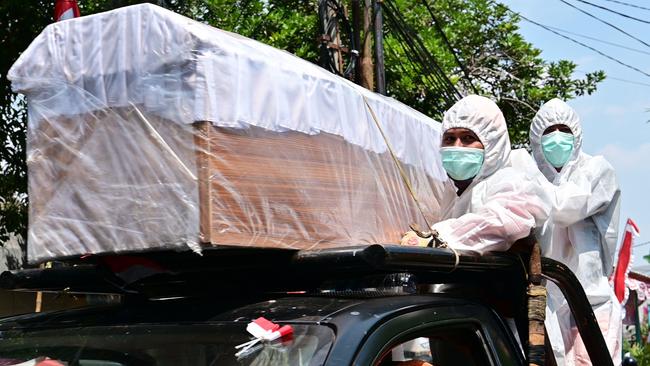Coronavirus: Jakarta to go back into lockdown from Monday
Jakarta is to reinstate widespread social restrictions from Monday after the city’s governor warned the Indonesian capital was facing a COVID-19 ‘emergency’.

Jakarta is to reinstate widespread social restrictions from Monday after the city’s governor warned the hospital system was on the verge of collapse and that the Indonesian capital was facing a COVID-19 “emergency”.
Anies Baswedan made the announcement on Wednesday night, urging Jakarta’s 11 million residents to stay home and “don’t leave Jakarta unless it’s very necessary”.
Coronavirus infections have been soaring for weeks with doctors across the city’s 67 COVID referral hospitals warning almost a fortnight ago they were close to capacity and already turning away patients for lack of beds.
“If there is no emergency brake by September 17, Jakarta’s isolation wards will be full. For ICU, the situation is not much better. We have 528 beds. If the trends continue and even if we increase it to 636 beds, they will fill up by September 25,” Mr Baswedan said in a livestreamed press conference.
“Even if we increase bed capacity, the number of active cases are rising more than capacity. The death rate, isolation ward occupancy, ICU occupancy all show that the outbreak in Jakarta is in emergency mode.
“Jakarta doesn’t have many choices besides to pull the emergency brakes as fast as possible.”
Mr Baswedan said the city administration hoped to increase hospital bed capacity by 20 per cent but warned it also had to make sure there were enough doctors, nurses, equipment, and medicine to match the extra capacity, “otherwise those beds will also fill up quickly by the second week of October”.
In a press release issued after the announcement the administration said that hospital capacity had “exceeded the safe limit and is expected to reach the maximum capacity on September 17, 2020. After that Jakarta health facilities will collapse”.
From Monday, all non-essential workers in the sprawling capital will be asked to work from home, all parks and entertainment venues will be closed, while restaurants and cafes will be allowed to operate for takeaway dining only. All major mosques will also be closed, and in neighbourhoods where cases are high local mosques will also be shuttered.
“Please let me advise you that you should do everything from home. Mass gatherings are not allowed. Crowds are not allowed,” Mr Baswedan said.
“Reunions, family occasions … please postpone these. The risk of infection is too high. The condition is an emergency even worse than at the beginning of the pandemic.”
The announcement comes a day after Indonesia’s COVID-19 caseload passed 200,000 and as Jakarta now accounts for around one-third of new daily cases across the country of 270 million people.
Jakarta has officially reported 1347 deaths from COVID-19 – from a national death toll of 8336 – but Mr Baswedan said there had been a rise in the number of probable cases of COVID deaths where the person had died before they could be tested.
A new risk assessment released earlier on Wednesday by researchers from Singapore’s Nanyang Technological University warned the city could soon face a situation where as many as 22 per cent of people being turned away from hospitals could die.
The city’s largest COVID referral clinic, Persahabatan Hospital, reported last week that they were already seeing a case fatality rate of 22.3 per cent of all coronavirus cases treated, almost one in four patients.
The team of social risk researchers from NTU also warned they did not see the city reaching its peak infection rate any time in the next two months.
“As of now, we can’t see it yet,” said NTU Social Risk expert Sulfikar Amir.
“If we create a modelling for more than two months, then we would deviate too far from the data set and it will be less accurate. But we don’t see it peaking in the next two months.”
Just last week, Indonesian President Joko Widodo told reporters he believed the country’s infections would peak this month and then flatten.
Jakarta is widely seen to have handled the pandemic better than most Indonesian provinces, and currently accounts for almost half of all COVID-19 testing conducted across the archipelago.
In the early months of the pandemic, Mr Baswedan was publicly at odds with the Indonesian central government, which had played down the seriousness of the virus and dragged its feet on establishing widespread testing and contract-tracing protocols.
The Jakarta administration was among the first to impose social restrictions – the country has avoided the term “lockdown” – on March 16 and began to gradually relax those restrictions from June.
But cases began to rise in the weeks after Id-ul-Fitri in late May, when millions of Indonesians returned to their villages for the important Islamic holiday despite repeated warnings from epidemiologists of the consequences, and again after the Id-ul-Adha festival in late July.
Mr Baswedan said the city’s COVID-19 testing positivity rate was 7 per cent compared to 14 per cent nationally, though the positivity rate climbed to 20 per cent on Wednesday with 3307 new cases reported from 15,335 people tested.



To join the conversation, please log in. Don't have an account? Register
Join the conversation, you are commenting as Logout